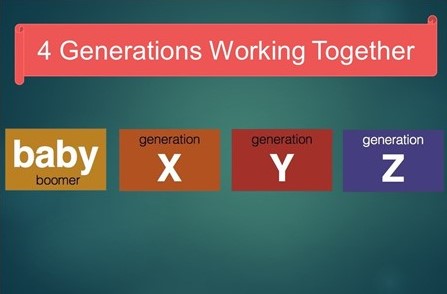Understanding Workforce Generations
A lot is said and written about the different generations in the workforce; some good and some bad. I think it’s important to understand the generations, their characteristics, differences and more importantly their impact on the workforce. A generation is defined as a group of people born around the same time and raised around the same place. Therefore these people display and exhibit similar characteristics.
Like everything we do in life people try to group and class people into different segments whether it be ‘the athletes’, ‘the wealthy’, ‘the educated’, ‘the rebels’ etc. Is categorising people into groups necessary? Does it achieve anything? In the case of employment market and workforce there have been many studies to indicate the significance and importance of these groups; hence generations. Most research examined will go back to the Baby Boomers, though there is a ‘class’ that precedes this known as ‘The Traditionalists’.
Baby Boomers born between 1946 – 1964 are traditionally those in senior management roles in the current workforce. Aged between 53 and 71 years they are viewed as the wealthiest of the generations and the hardest working, with prediction that most will work well into their 70’s. During the time of the Baby Boomer the population soared (with over 4 million Australians born in this era) as well as increased migration. They were seen as the generation of hope and change. There were advances in technology with the LP vinyl records introduced and new styles of music. In addition, attitudes were changing; miniskirts became fashion and there were protests for equality. Baby Boomers enjoyed a time of free tertiary education and low housing costs. With parents having lived through The Great Depression they were known as the generation that had it all! With all the benefits they had received during the 40’s – 60’s they are now viewed by other generations as ‘stuck in their ways’.
Generation X born between 1965 and 1980 are considered the first generation that will not do as well financially as their parents. They are perceived in the workforce as ‘lazy’/’uncommitted’ and ‘slackers’. This attitude derives from their typical work ethic characteristics that they work smarter not harder and their scepticism of authority figures. Aged between 37 – 52 they are likely to be part of a dual income family with the first generation to utilise childcare. Shifting from their workaholic Baby Boomer parents, Gen X’s have a greater focus on work/life balance and are happy to take time off from work without fear of losing their ‘steps on the ladder’. With a key focus on balance they are less inclined to be work driven and often demonstrate attributes of entrepreneurship, independence and diversity.
Gen Y (Millennials) born 1981 – 2000 are considered the ‘tech focussed generation’. Aged between 17 – 36 years they have grown up in a truly ‘mobile’ world. They are the first generation to have never experienced a pre-internet world. They have information readily accessible and are viewed as the most consistent generation in terms of behavioural. Those in Gen Y will tend to worry about financial matters for the majority of their work life, this anxiety could affect their work performance and prospects. Their biggest concern with be ‘savings’ and their earning potential from their employer, secondly job security and also income growth will play a factor. Those in Gen Y have an increased likelihood of being brought up by divorced parents, have been more protected and sheltered by their parents and are the first generation of children to have been brought up by schedules.
Generation Z is considered people born post 2000 and aged >17 years old. This is the generation that are just entering the workforce now. It is predicted that this gen will be the most formally educated generation in history with children attending school earlier and studying longer. Children will be brought up with older and wealthier parents and have fewer siblings. They will be even more advanced in technology and will be classed and viewed as ‘materialistic’.
Our current workforce is made up of all four generations therefore we need to be able to understand and sometimes embrace our differences in order to achieve success together.



